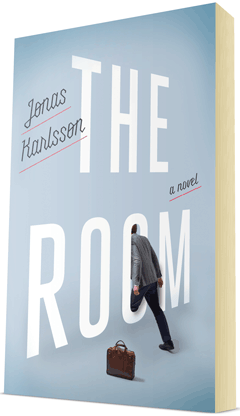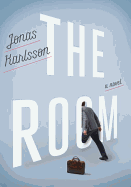The Room
by Jonas Karlsson
"The first time I walked into the room I turned back almost at once."
From this skillfully subtle opening line, the titular room is spotlighted as the crux of a strange and surreal tale. The first-person narrator of Jonas Karlsson's The Room remains nameless for much of his story. He assures the reader that he has been given his new position working for the Authority because of the outstanding work done at his last post--as implied by his boss, "gesturing upwards with his hand to indicate my career trajectory." This narrator, eventually identified as Björn, is a consummate bureaucrat and couldn't be prouder of his efficiency. He sets himself a strict schedule: 55 minutes of work followed by five minutes of break time for coffee, toilet and sundry; if he needs the toilet sooner, he practices restraint.
Björn is odd from the first, but we take him at his word: he is good at his job, perhaps not well-liked by his fellows, but effective and ambitious. In this new post, he is determined to work his way to the top, and secretly exults in a future in which his boss Karl will acknowledge Björn's prowess and grovel for his approval. Social awkwardness is his greatest challenge. His attempts to infiltrate the politics and society of his new office environment are clumsy; nonetheless, he endures the Christmas party. He's unhappily positioned at the very center of the open-plan office space, with a boorish deskmate whose piles of paper threaten to encroach upon Björn's territory.
On the other hand, there is the room. Björn discovers it by accident while looking for the toilet. It is a lovely space, a perfectly appointed, perfectly proportioned, old-fashioned, classy office. In his eyes, "The whole room breathed tradition.... Is this what monks feel like as they walk the corridors of their monasteries?" He catches sight of himself in the mirror, and is struck by how good he looks, despite not usually feeling that he is attractive, or even worrying about such things. His suit even fits better when he is in the room.
Björn begins visiting the room regularly, and a problem arises. His coworkers see him standing in a particular spot, along the hallway on the way to the toilets. He just stands there, entirely still and dead to the world, looking contented. This is unnerving. They don't see the room; the room doesn't exist on architectural plans or for anyone else; Björn concedes that, when he paces it off, no room should fit in that precise space. The other fourth-floor employees of the Authority gang up on him, enlisting the boss's power against him, and he is instructed to never enter "the room" again, under any circumstances. But Björn knows that he is a worthy opponent for these small-brained incompetents. He takes on a protracted confrontation in which these conflicts only deepen.
Björn is an exemplary unreliable narrator. As in the best instances, the reader is left to put together fractured pieces of information shared along the way, and struggle to devise the truth of the room and Björn's sanity. It's tempting to flip back to earlier scenes and reconsider. Who is crazy here, Björn or his colleagues? Is he the last breath of reason in an insane world, or vice versa? Are we observing the workings of magic, fantasy, conspiracy or madness? Is this really modern Stockholm, or an Orwellian nightmare? The parallel realities experienced by Björn and his colleagues, and the high-strung nature of his interior drama, are sketched with exquisite subtlety in deceptively simple language, and Neil Smith's translation from the Swedish is pitch perfect. The Room simultaneously approaches claustrophobia in its physical scope and achieves boundless significance.
There are several levels to the uncomfortable probing Karlsson undertakes throughout Björn's odd tale. Clearly this is in part a critique of bureaucracy and office politics (is it really ideal to dispose of your problem employee by putting him to work restocking printer paper?), but Karlsson also sketches larger doubts about the subjectivity of reality, social graces and the importance of control over the different aspects of our lives.
Karlsson's prose and the inventiveness of Björn's surreal mental workings are often funny; indeed, the humor comes in moments of breathless surprise that amplify its effect. This story will, of course, strike comic chords with the cube-dwelling set. But the overall impact is also deeply thought-provoking and profoundly disquieting, and the combination of the banal and the absurd results in a striking and singular read.
The Room is a very slim book with a very large footprint, recalling Kafka and Beckett, and posing questions about the nature of truth as well as the value of defining one's own work and life. As the reader interprets Björn's world and social cues, doubts are cast on his belief in his own superiority. But the drama persists until the final, bizarre conclusion. --Julia Jenkins








